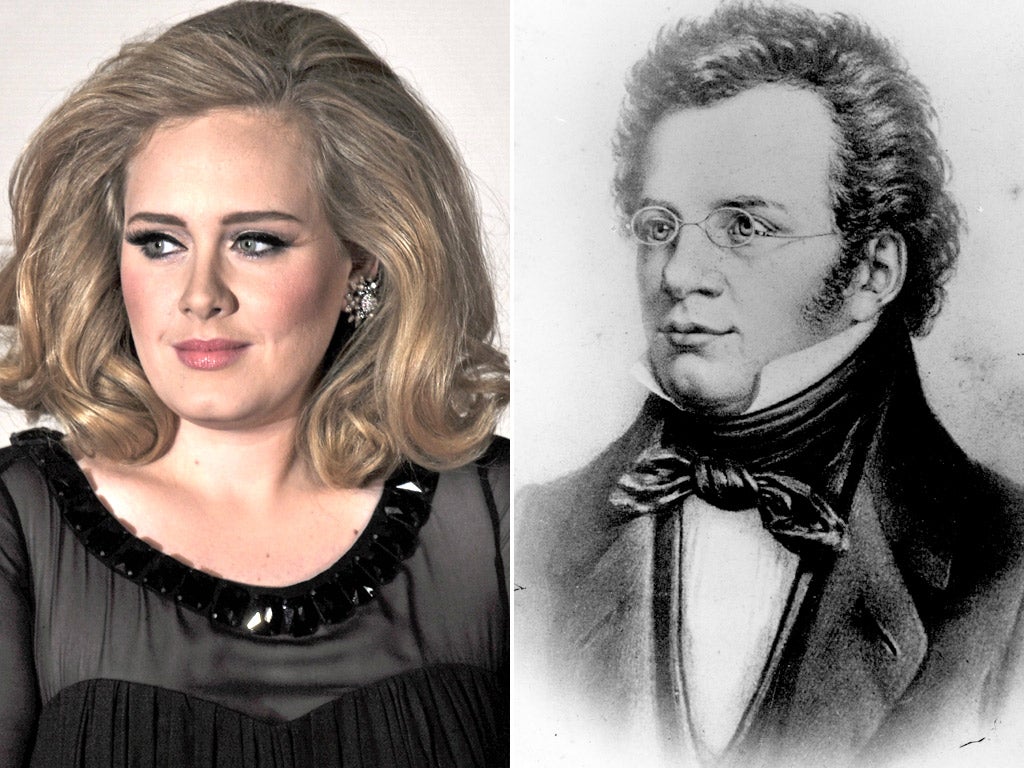Adele's music owes a debt to Franz Schubert according to new BBC show analysing music 'from the Stone Age to the Digital Age'
Composer Howard Goodall, who has written and presented the show, says he wants to 'show a straight line that runs through to the present day'

Your support helps us to tell the story
From reproductive rights to climate change to Big Tech, The Independent is on the ground when the story is developing. Whether it's investigating the financials of Elon Musk's pro-Trump PAC or producing our latest documentary, 'The A Word', which shines a light on the American women fighting for reproductive rights, we know how important it is to parse out the facts from the messaging.
At such a critical moment in US history, we need reporters on the ground. Your donation allows us to keep sending journalists to speak to both sides of the story.
The Independent is trusted by Americans across the entire political spectrum. And unlike many other quality news outlets, we choose not to lock Americans out of our reporting and analysis with paywalls. We believe quality journalism should be available to everyone, paid for by those who can afford it.
Your support makes all the difference.When Adele won six Grammys in February she made an emotional speech thanking her family for their support and the influence of her producer.
She might have thanked 19th century composer Franz Schubert although she may not have been aware of his influence on her work, according to a new BBC show that pledges to chart the history of music “from the Stone Age to the Digital Age”.
The Emmy, Brit and Bafta-winning composer Howard Goodall, who has written and presented a show charting the development of music from classical composers to pop stars, said: “I want to show a straight line that runs through to the present day,” he said.
He uncovered musical connections between classical composers and their pop and rock counterparts of the modern day, although admitted the current stars may be unaware of the debt.
His examples included linking Schubert and Adele, whose hit songs include Rolling in the Deep and Someone Like You.
“Strip away the cultural differences, the clothes and anything that dates them, and there is a strong connection,” Mr Goodall said. “The musical shape, the architecture of it, the kind of chords, the way the accompaniment works and the voice sits on it, even the subject matter, are remarkably similar.”
He compared Adele’s work, including bestselling album 21, with Schubert’s song cycles such as The Winter Journey and Swan Song. “They’ve got catchy tunes, and are emotionally straightforward.”
Among other notable connections he picked out included Johann Sebastian Bach – who he dubbed “easily the cleverest composer who ever lived” – and David Bowie, whether the rock star was aware of it, or not.
“It’s not difficult to find a connection,” Mr Goodall said. “It’s about chord sequences. In the 17th century they had an obsession with finding chords that were magnetic to each other. Bach developed a particular downward stepping base of the chords. You can find that in Changes, Life on Mars and All the Young Dudes.”
Enjoy unlimited access to 100 million ad-free songs and podcasts with Amazon Music
Sign up now for a 30-day free trial
Enjoy unlimited access to 100 million ad-free songs and podcasts with Amazon Music
Sign up now for a 30-day free trial
The six hour-long episodes of Howard Goodall’s Story of Music are to screen on BBC 2 next month, tracking the development of western music “from the Stone Age to the Digital Age”. Mr Goodall will also discuss 50 important works for a tie-in programme on Radio 3.
The programme covers musicology, social history and education and attempts to redefine classical terminology. Mr Goodall abandons traditional categories including Baroque, Classical and Romantic in favour of “ages”. These include the Age of Discovery, Inventions and Rebellion.
He said: “The terminology is incredibly unhelpful. Like Baroque – it has nothing to do with Baroque art and architecture. I thought we were walking through treacle to explain turns that were inaccurate and unhelpful.”
The composer said he wanted to redo all of music’s jargon. “Octave, symphony, semitone, interval… all that terminology is terrible.”
This involved his picking out some surprise choices for influential composers. He said that while Franz Liszt would make few “top fives” he “completely dominated the second half of the 19th century”.
A surprise English choice to focus on was John Dunstaple, who died in 1453, because he “changed music in Europe”. Mr Goodall said: “Dunstaple did something to chords and at that time England was fighting an occupied war in France. His ideas on chords went to France and across Northern Europe like wildfire.”
Mr Goodall has composed choral music, done work for stage musicals as well as film and television scores such as Red Dwarf, Mr Bean and Blackadder.
Join our commenting forum
Join thought-provoking conversations, follow other Independent readers and see their replies
0Comments